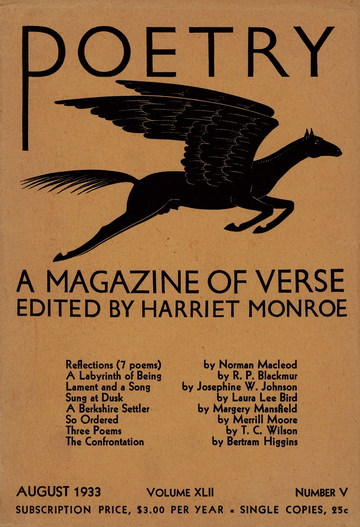The Whippet #144: What of it, if some old sea-captain orders me to get a broom and sweep down the decks?
On this page

At the start of 2022, I wrote about four animals with a fun naming pattern I'd recently found out about:
- the Sarcastic Fringehead
- the Stoplight Loosejaw
- the Silken Windhound
- the Raspberry Crazy Ant
In delightful news, someone (Dan) made a bot that generates animals based on that structure!
I like 'Microtine Rivercow' and 'Tangerine Mountaintongue'
See Weird Menageries on twitter.
The Whippet doesn't really generate fan-art, so this is the closest I'm gonna get. Wait that's not true, someone wrote a villanelle about the bearded vulture in response to me extolling its horrible virtues.
PS If you're in Melbourne, for the love of god see Laura Davis's comedy show. I mean, there's a lot of good stuff on at the comedy festival, but if you see one thing, make it Laura Davis. She's incredible, not like anyone else you've seen, very very very funny, and may not be back in Australia for many years.
She's playing every night from now until the 24th of April. Tix $22 - $30. No audience participation.
Book a ticket! Go and see her! I'm telling you!

How good Laura Davis is: Even though I have friends who have shows at the comedy festival, who read this newsletter, I'm not worried about any of them feeling offended that I didn't plug their shows, because they will all be like "McKinley's right, you should go see Laura Davis".

Terrible maps
I love this twitter account, not just because the maps are funny, but because they show you the limitations and purposes of maps by misusing the tool badly.
It's the spiritual cousin of Jorge Luis Borges' Celestial Emporium of Benevolent Knowledge (the list of unhelpful categories).
Borges had another short piece, "On Exactitude in Science" (could also be translated, "On scientific rigour"), about a map of an empire made to a 1:1 scale.
Railway map of Antarctica pic.twitter.com/AWdyuYUsTS
— Terrible Maps (@TerribleMaps) April 10, 2022
Egypt is smaller than the United States, Russia and China combined pic.twitter.com/l7SKYY5375
— Terrible Maps (@TerribleMaps) October 9, 2021
Is this country North Korea? pic.twitter.com/0rNI7GXHWS
— Terrible Maps (@TerribleMaps) October 29, 2021
Neil Gaiman
The more accurate the map, the more it resembles the territory. The most accurate map possible would be the territory, and thus would be perfectly accurate and perfectly useless.
Lewis Carroll
"And then came the grandest idea of all ! We actually made a map of the country, on the scale of a mile to the mile!"
"Have you used it much?" I enquired.
"It has never been spread out, yet," said Mein Herr: "the farmers objected: they said it would cover the whole country, and shut out the sunlight ! So we now use the country itself, as its own map, and I assure you it does nearly as well."
Wikipedia article titled 'Map–territory relation'
Polish-American scientist and philosopher Alfred Korzybski remarked that "the map is not the territory" and that "the word is not the thing", encapsulating his view that an abstraction derived from something, or a reaction to it, is not the thing itself. Korzybski held that many people do confuse maps with territories – that is, confuse models of reality with reality itself.
René Magritte
Ceci n'est pas une pipe
~ camouflage ~
My other #WildOz moment from yesterday was finding this wrap-around spider. I’ve never seen them not paralysed by a parasitic wasp, so it was a delight to see the little character alive and camouflaged pic.twitter.com/goacdbSZVu
— Henry Cook (@Manic_Henry) January 24, 2022
Look at the little guy!!
Stripping out the questions from works of literature
If you put a block of text into this web tool made by Clive Thompson, it'll strip out the questions for you.
This is the first chapter of Moby Dick:

As he points out in his essay, you might want to try a memoir, or a famous speech. Fiction is often less interesting, because most of the questions are in dialogue, and often back and forth, so they come through relatively unaltered. E.g. this is the first chapter of Pride and Prejudice, and it doesn't reveal anything fresh, it's just the main conversation of the chapter:
“My dear Mr. Bennet,” said his lady to him one day, “have you heard that Netherfield Park is let at last?” “Do not you want to know who has taken it?” “What is his name?” “Is he married or single?” “How so? how can it affect them?” “Is that his design in settling here?”
But it's fun to play around with anyway.
Only the Questions web tool
The algorithm is changing online speech so much to outwit the algorithm that its becoming a distinct dialect
Most social media has an algorithm that decides whether your posts get shown to your followers or not. Successful content creators have to constantly chase the algorithm's most recent form, because it's the only way to stop your posts getting buried. TikTok is this turned up to eleven, partly because its algorithm is very good, and partly because it can parse speaking, not just text.
The algorithm tends to be a pretty blunt instrument: it can't tell the difference between racism and people saying "racism is bad", between just existing as LGBTI and sexual content, etc. So suicide support workers have to say things like "if you're thinking of unaliving yourself, please [insert good advice]". And you've probably heard some of the extremely oblique ways Chinese dissidents have of referring to the government.
This kind of thing has been around since early messageboards, but the amount of content it covers is on a whole nother level now.
Anyway I found this Taylor Lorenz article in the Washington Post really fascinating! Even more fascinating was this bootleg version, since it's not paywalled and therefore I actually read it. Plus it's authored by the definitely real non-plagiarist journalist "Magnum Hermosa".
Dust
Someone spoke to me last night,
told me the truth. Just a few words,
but I recognized it.
I knew I should make myself get up,
write it down, but it was late,
and I was exhausted from working
all day in the garden, moving rocks.
Now, I remember only the flavor —
not like food, sweet or sharp.
More like a fine powder, like dust.
And I wasn’t elated or frightened,
but simply rapt, aware.
That’s how it is sometimes —
God comes to your window,
all bright light and black wings,
and you’re just too tired to open it.
This dust poem by a completely unrelated poet is good too:


Unsolicited Advice: Don't forget you can quit
Another collection on a theme.
This is from one of Oliver Burkeman's columns:
The British-born Zen master Roshi Jiyu-Kennett used to say that her philosophy, when it came to teaching students, wasn’t to try to lighten the burdens they carried through life, but to make those burdens so heavy they’d choose to put them down.
Sometimes making the unbearable bearable is the worst thing you can do.
And these are some lyrics I've been speak-singing to myself since 2005. It's from Art Brut's Stand Down, a song about how being in a band is hard and they're thinking of giving up. Contains the refrain Some of us want to go back to our families chanted over and over.
I'm delighted to have found
if it's too heavy
you can just
put
it down
This poem:
Heavy
When the gods died
The myths were lifted off our backs.
Peace be with them.
They were heavy.
(I'm writing this from memory because I can't find it on google. Hence lack of attribution and maybe errors).
This sticker that I got for subscribing to the extremely good newsletter Today in Tabs (it's free to read, check it out):

This from da share z0ne:

If you have anything thematically relevant, please share! Can never have this messaged propagandised strongly enough.

Today's useful extension: Volume over-clocker
This extension lets you turn your volume up past 100% in your browser.

Turning your volume up louder than the manufacturer recommends can shorten the life of your computer's speakers, so only use this when the sound recording is shitty and the youtube/teachable guy is too quiet.
Don't use it to make something super loud so you can listen to TED talks while you're practising your screaming.
(If you need to increase volume past 100% on your regular video player, that means you're not using VLC media player. If you're using whatever came with your computer, switch to VLC, it's way better. Free.)

Comments
Sign in or become a Whippet subscriber (free or paid) to add your thoughts.
Just enter your email below to get a log in link.
A newsletter for the terminally curious
Arrives in your inbox every second Thursday.

